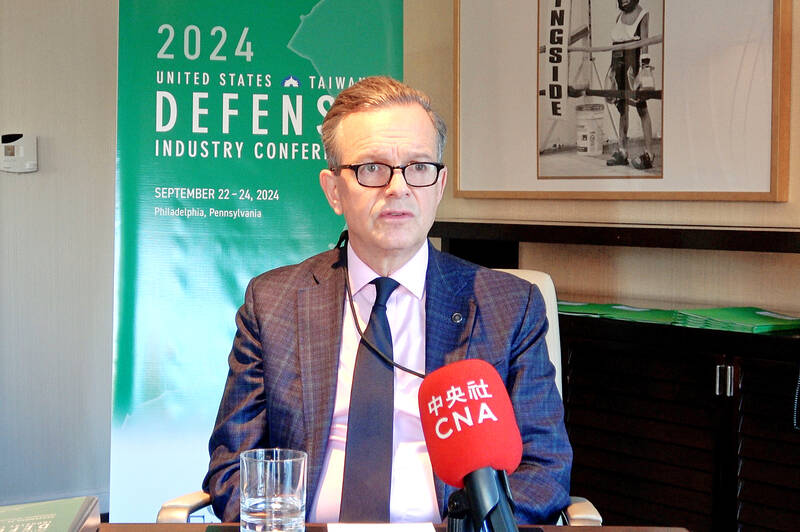The US and Taiwan are “100 percent” committed to jointly manufacturing weapons, but the complexities involved in such an arrangement could pose challenges, a defense expert said on Tuesday.
There is a “great deal of momentum right at the very top of the US government and the Taiwan government for coproduction” of weapons, US-Taiwan Business Council president Rupert Hammond-Chambers said on the sidelines of the US-Taiwan Defense Industry Conference in Philadelphia.
Since its debut in 2002, the annual conference has facilitated engagement among the US defense industry, Taipei and Washington on security matters, said the council, which organized the event.

Photo: CNA
Asked to comment on the prospect of the US and Taiwan coproducing weapons after Taipei and Washington expressed in interested in the idea, Hammond-Chambers said that the countries’ commitment to coproduction is “100 percent,” but that many details still needed to be sorted out.
“I don’t think it’s a matter of if there will be coproduction, it’s a matter of what will be coproduced and when will it be coproduced,” he said.
The cost-effectiveness of joint production and the buyers that would be targeted, given the sensitivity of “one China” policies held by most countries, would also have to be considered, he said.
Other issues, including who would be the next US president or potential attempts by Taiwanese opposition parties to cut defense spending in the coming years could also cause “significant political problems,” he added.
“These big issues all have to be worked at, and we are in the early stages of working that out,” he said.
During this year’s conference, Vice Minister of National Defense Hsu Yen-pu (徐衍璞), who led Taiwan’s delegation to the gathering, urged Washington to include Taipei in a list of countries with which it engages in joint or licensed weapons production.
US Principal Deputy Assistant Secretary of Defense for Indo-Pacific Security Affairs Jedidiah Royal on Monday said that the US would soon launch the Partnership for Indo-Pacific Industrial Resilience with at least 12 US allies in the Indo-Pacific region and Europe, including Taiwan.
It would address supply chain constraints regarding weapons, a source who attended the closed-door speech cited Royal as saying.

The inspection equipment and data transmission system for new robotic dogs that Taipei is planning to use for sidewalk patrols were developed by a Taiwanese company, the city’s New Construction Office said today, dismissing concerns that the China-made robots could pose a security risk. The city is bringing in smart robotic dogs to help with sidewalk inspections, Taipei Deputy Mayor Lee Ssu-chuan (李四川) said on Facebook. Equipped with a panoramic surveillance system, the robots would be able to automatically flag problems and easily navigate narrow sidewalks, making inspections faster and more accurate, Lee said. By collecting more accurate data, they would help Taipei

TAKING STOCK: The USMC is rebuilding a once-abandoned airfield in Palau to support large-scale ground operations as China’s missile range grows, Naval News reported The US Marine Corps (USMC) is considering new sites for stockpiling equipment in the West Pacific to harden military supply chains and enhance mobility across the Indo-Pacific region, US-based Naval News reported on Saturday. The proposed sites in Palau — one of Taiwan’s diplomatic allies — and Australia would enable a “rapid standup of stored equipment within a year” of the program’s approval, the report said, citing documents published by the USMC last month. In Palau, the service is rebuilding a formerly abandoned World War II-era airfield and establishing ancillary structures to support large-scale ground operations “as China’s missile range and magazine

A 72-year-old man in Kaohsiung was sentenced to 40 days in jail after he was found having sex with a 67-year-old woman under a slide in a public park on Sunday afternoon. At 3pm on Sunday, a mother surnamed Liang (梁) was with her child at a neighborhood park when they found the man, surnamed Tsai (蔡), and woman, surnamed Huang (黃), underneath the slide. Liang took her child away from the scene, took photographs of the two and called the police, who arrived and arrested the couple. During questioning, Tsai told police that he had met Huang that day and offered to

A British man was arrested for attempting to smuggle 14.37kg of marijuana into Taiwan through Taiwan Taoyuan International Airport, Taipei Customs said late yesterday. The man, who arrived from Bangkok at 9pm on Friday, was asked by customs officers to open his luggage during a random inspection, Taipei Customs said in a news release. The passenger, whose identity was not disclosed, refused to open his suitcase and tried to flee the restricted area. He was eventually subdued by three customs officials and an Aviation Police Bureau officer. A later search of his checked luggage uncovered 14.37kg of marijuana buds. The case was handed over